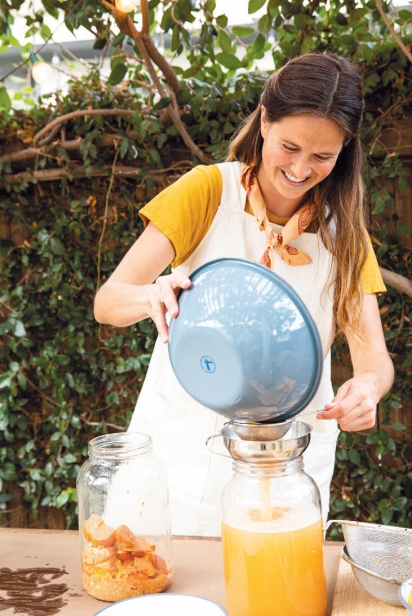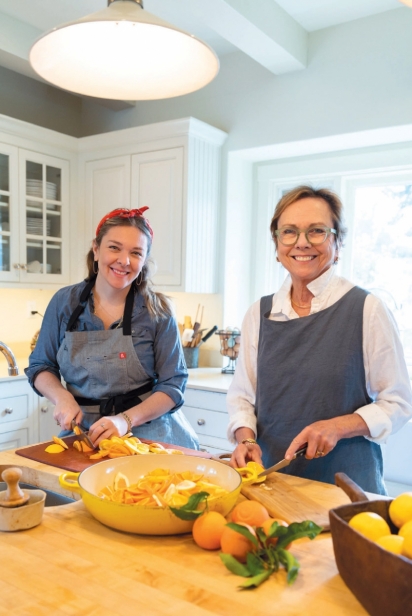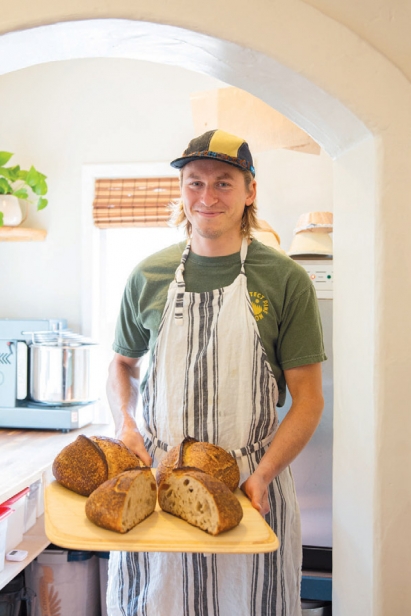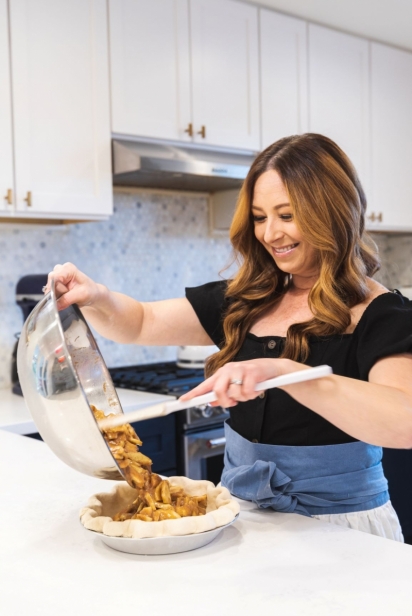Cooking Up a Business
Cottage law enables food ventures to launch during pandemic
When the coronavirus exploded last March, the world seemed to come to a sudden halt. My employer warned of furloughs, and the future felt uncertain.
Just about every weekday routine and weekend tradition—morning walks for coffee, trips to the farmers market, hosting friends for brunch or dinner parties—was thrown off. I began brewing kombucha, making fruit vinegars and harvesting vegetables from my garden and fruit from my neighborhood. Digging into cookbooks for recipe inspiration, the place I felt most safe, happy and free to be a creative spirit was in the comfort of my own home kitchen.
By April, my hours were reduced at work: I had every Friday off, which afforded me an opportunity to volunteer at my favorite local farm, Fairview Gardens in Goleta. I spent time covered head to toe in dirt, dreaming up plans for my own future farm. I couldn’t stay away from the idea of using seasonal fruit from regional farms in my very own homemade fruit vinegars.
One morning, it hit me: Could I source fruit from Fairview and sell my products at their farm stand? Could I turn this idea of mine into a real side hustle?
Businesses launch in many ways: a childhood passion, a pipe dream inspired by a favorite food memory, a problem to solve. Some food and beverage entrepreneurs move straight into a commercial kitchen while others start out in their homes. If you’re cooking or baking at home, wondering how to graduate from sharing your creations with friends to legitimately selling, there’s a program out there worth getting to know: Cottage Food Operations (CFOs, see sidebar, p. 31).
According to Sue Seiler, an environmental health specialist with the County of Ventura, “the number of Cottage Food Operations applications has been on the rise. We had a record number of applicants in 2020.”
Sami Weiss, a friend and former farm manager at Fairview Gardens, suggested I look into the Cottage Food Operations program. “If you can get your hands on a Class B Permit, we’d love to sell your fruit vinegars at the farm stand! We’d be glad to sell you fruit for your shrubs, too.”
Dana Solum, another environmental health specialist with the County, guided me through the application paperwork and a COVID-safe home inspection via Zoom.
My Class B Cottage Permit was approved in June 2020, and I immediately launched the business on Instagram.
Nearly nine months later, Sideyard Shrubs (see story on p. 4) is busier than ever. We launched a website and received many orders over the holidays. We’re selling in 15 retailers now, with more coming soon. While I don’t have any grand plans to quit my day job, I am exploring local commercial kitchen space. We’re outgrowing our apartment and hope to relocate the business and turn our home back into … a home!
Here are three more inspiring local Cottage Food Operations:
B Hill Farm
When Lucy Bennett’s busy work life as a reality television show producer in Los Angeles slowed due to COVID, she returned home to Ojai to be closer to her parents, but soon felt a lost sense of purpose.
Lucy’s mom, Carolyn Bennett—a long-time farmer and chef—cans marmalade and packs granola for gifts, using ripe, seasonal produce grown on her farm property. Lucy marveled at her mother and wondered how she might turn those treasured recipes into sellable products. After finding Ventura’s CFO program’s website, Lucy identified which recipes fit the requirements. The initial goal was to sell from a farm stand, which Lucy and her boyfriend built from scrap wood.
Soon, Carolyn’s recipes were approved, Lucy had a Class A Cottage Permit in hand, and B Hill Farm was born. Carolyn and Lucy supplied their farm stand every day and operated on the honor system: Anyone could leave cash in exchange for seasonally inspired items. They created an Instagram account to promote the farm stand and accept orders.
Lucy’s freelance job eventually called her back into work, which meant scaling back business dramatically.
While Lucy was especially sad to pause B Hill Farm, she says, “The joy of the process was worth it. The Cottage Permit allowed us to launch the concept and provide a resource for people in Upper Ojai. Many customers expressed gratitude for our little business, and the opportunity to pick up local goods without entering a grocery store during COVID.”
Lucy has since filed with the City of Ojai to reopen the farm stand from her own recently purchased home in town.
To be updated on the farm stand follow @b_hill_farm on Instagram.
Headwinds Bake Club
For Dan Swihart, baking bread was a fuzzy dream in the back of his mind for years. Originally from the Midwest, Dan relocated to the Bay Area working in the corporate world. He sought out trails to bike and started baking bread as a release from everyday life. “There’s so much good bread in the Bay, and I wanted to reproduce the best of what I bought.”
In March 2019, Dan and his partner relocated to Ventura.
“I always found something creative and intimate in food,” he says. “Time slows down when I work with my hands, especially baking, and I wanted to start a business that allowed me to do that.”
Over time, Dan offered fresh bread to friends, and positive feedback rolled in. Dan soon looked into the Cottage Food program and realized his dream of cultivating community around bread when he launched Headwinds Bake Club.
In addition to sourdough breads—like Seeded Sourdough, Classic Country Sourdough, Whole Wheat and Olive—Dan offers bagels, cookies, cinnamon rolls and hand pies. When it comes to ingredients, Dan invests in local, organic suppliers like Roan Mills in Fillmore and The King’s Roost in Los Angeles. Dan also supports the important and inspiring work of Tehachapi Heritage Grain Project, as an extension of Dan’s own commitment to supporting regional milling and preserving heirloom grains.
Dan gained his Class A Cottage Permit in November 2020. “The Cottage program is flexible and more affordable than a commercial setting,” he says. “An easy first step to explore a food business idea, and a great way to get your product out there and see if it has legs.”
Since day one, Dan has delivered his baked goods on bike “to start conversations with customers and be an advocate for bike accessibility and safer bike infrastructure.”
The business name, Headwinds Bake Club, underscores Dan’s deep love for cycling and even deeper commitment to supporting community: “Starting a bake club was important to me, because I want to build a business that cultivates community and feels like something all people can belong to.” Headwinds are easier to face when you face them together, he says.
Looking ahead, Dan talks about opening a brick-and- mortar shop in Ventura, “a community hub with a social atmosphere.” He hopes to offer programming and events like pizza nights.
For more information, visit HeadwindsBakeClub.com.
805 Pies
Jessica Zavala’s passion for baking pies found direction in November 2019. Born and raised in Ventura, Jessica juggled a full-time job when she first contemplated her business. She explored a shared space in a commercial kitchen in Ventura, but that didn’t pan out. When a friend suggested Jessica apply for a CFO Permit, Jessica contacted the Ventura County Environmental Health Division to learn more.
“While the application process may seem intimidating, my experience was just the opposite,” Jessica says. “My inspection fell on the Monday before Thanksgiving. I was anxious for approval, because I already had 70 orders waiting!”
From her kitchen with a Class B Cottage Permit, Jessica makes and sells full-sized pies, mini pies and heart-shaped hand pies inspired by seasonal fruit.
While there’s no farmers’ market in Santa Paula, Jessica sources fruit from local farms—she loves the fruit stand at Prancers Farm in Fillmore, and often scores fresh-picked strawberries from Fukutomi Farms in Oxnard.
Jessica’s commitment to seasonal fruit stems from her grandparents, avocado and citrus farmers who taught her early on to pick fruit right off the tree. Jessica’s proud to use apples and lemons from her grandparents, apricots from her neighbor and oranges from her own backyard.
“If you’re on the fence about starting a business, start with the Cottage Food program! You’ll be amazed by the support, especially at a time when so many are at home,” she says.
805 Pies has been so successful that Jessica quit her job and now bakes pies full-time. When asked about the future, Jessica talked about her dream of converting an old trailer into a mobile pie bar to bring to local events, and also hopes to offer pie-baking classes in her home.
Jessica has a committed Instagram following (@805Pies) and sells on her website (805Pies.net) and by the slice at Two Trees Restaurant in Ventura.
MORE ABOUT CFOs
Cottage Food Operations (CFOs) allow certain low-risk foods to be prepared and sold from a residence provided certain requirements are met. All CFOs must meet California Health and Safety Codes related to:
• Preparing low-risk foods that are on the approved list
• Completing a food processor training course within three months
• Implementing sanitary operations
• Establishing state and federal compliant labels
The Cottage Program offers two classes of permits:
Class A: Direct Sales Only (sales from you, directly to customers)
Class B: Direct & Indirect Sales (the above, plus sales to other stores for re-sale)
Approved Cottage Foods include bread, cookies, pastries, granolas, honey, jams, jellies, vinegars, teas, confections and more. Within Ventura and Ojai, all applications are approved through the County Environmental Health Division.
For more information about Cottage Food Operations, visit Ventura County EHS: VCRMA.org/Cottage-Home-Food-Operations or Santa Barbara County EHS: CountyofSB.org/phd/ehs/Cottage-Food-Operations.sbc









